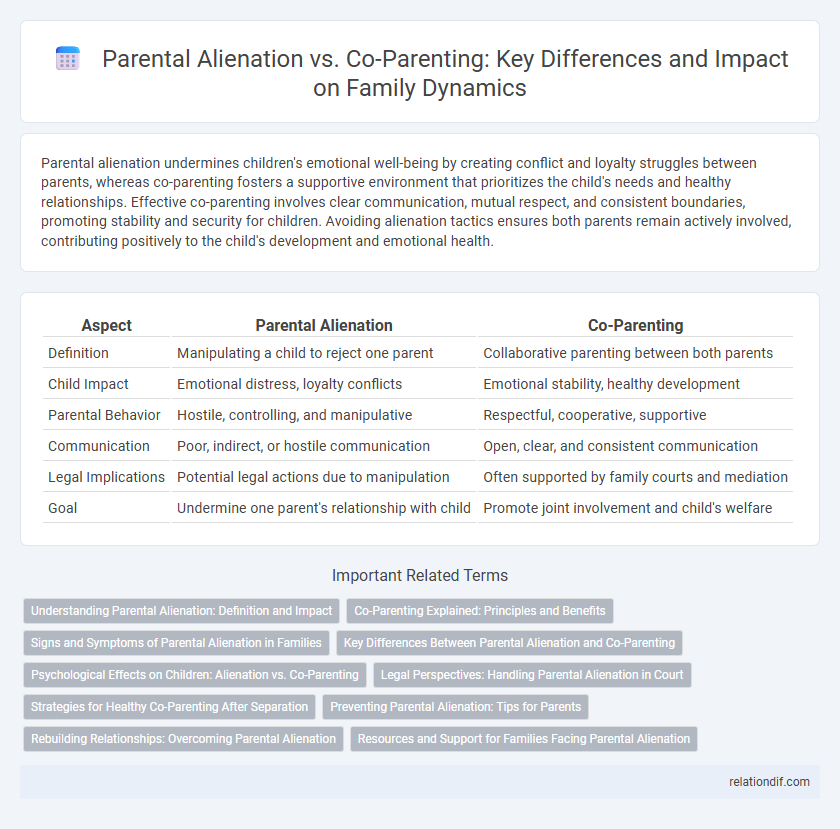Parental alienation undermines children's emotional well-being by creating conflict and loyalty struggles between parents, whereas co-parenting fosters a supportive environment that prioritizes the child's needs and healthy relationships. Effective co-parenting involves clear communication, mutual respect, and consistent boundaries, promoting stability and security for children. Avoiding alienation tactics ensures both parents remain actively involved, contributing positively to the child's development and emotional health.
Table of Comparison
| Aspect | Parental Alienation | Co-Parenting |
|---|---|---|
| Definition | Manipulating a child to reject one parent | Collaborative parenting between both parents |
| Child Impact | Emotional distress, loyalty conflicts | Emotional stability, healthy development |
| Parental Behavior | Hostile, controlling, and manipulative | Respectful, cooperative, supportive |
| Communication | Poor, indirect, or hostile communication | Open, clear, and consistent communication |
| Legal Implications | Potential legal actions due to manipulation | Often supported by family courts and mediation |
| Goal | Undermine one parent's relationship with child | Promote joint involvement and child's welfare |
Understanding Parental Alienation: Definition and Impact
Parental alienation occurs when one parent deliberately manipulates a child to reject or fear the other parent, leading to emotional estrangement that can severely impact the child's psychological well-being and development. Understanding the signs, such as unjustified hostility or unwarranted fear toward the alienated parent, is crucial for addressing and preventing long-term damage. Effective co-parenting fosters open communication and cooperation, promoting healthy child-parent relationships and counteracting the adverse effects of parental alienation.
Co-Parenting Explained: Principles and Benefits
Co-parenting involves both parents actively collaborating to raise their children despite separation or divorce, emphasizing effective communication, mutual respect, and consistent parenting practices. This approach fosters emotional security and stable development for children by maintaining balanced involvement from both parents. Unlike parental alienation, which damages relationships through manipulation and exclusion, co-parenting promotes healthy family dynamics and long-term well-being for the child.
Signs and Symptoms of Parental Alienation in Families
Parental alienation manifests through behaviors such as a child's unjustified rejection of one parent, irrational fear or hostility, and refusals to engage in visitation or communication. Signs include manipulative storytelling, disparagement of the targeted parent, and emotional withdrawal often driven by the alienating parent's influence. Recognizing these symptoms early is crucial for preserving healthy co-parenting dynamics and promoting the child's well-being.
Key Differences Between Parental Alienation and Co-Parenting
Parental alienation involves one parent undermining the child's relationship with the other parent, often leading to emotional estrangement and conflict. Co-parenting emphasizes collaborative parenting strategies where both parents support the child's well-being and maintain positive communication despite separation. Key differences include the presence of mutual respect and cooperation in co-parenting versus manipulation and hostility in parental alienation scenarios.
Psychological Effects on Children: Alienation vs. Co-Parenting
Parental alienation often leads to increased anxiety, depression, and attachment issues in children due to the manipulation and enforced loyalty conflicts between parents. In contrast, cooperative co-parenting fosters emotional security, resilience, and healthier psychological development by promoting consistent support and positive communication. Research highlights that children in co-parenting environments display fewer behavioral problems and stronger social skills compared to those experiencing parental alienation.
Legal Perspectives: Handling Parental Alienation in Court
Courts address parental alienation by prioritizing the child's best interests, often ordering psychological evaluations and enforcing custody modifications to restore healthy parent-child relationships. Legal measures may include supervised visitation, parenting coordination, and sanctions against the alienating parent to prevent emotional harm. Judges increasingly recognize parental alienation as a form of emotional abuse, shaping rulings to promote cooperative co-parenting and mitigate long-term psychological damage.
Strategies for Healthy Co-Parenting After Separation
Effective communication techniques and consistent routines remain essential strategies for healthy co-parenting after separation, minimizing misunderstandings and reducing parental alienation risks. Establishing clear boundaries and mutual respect aids in prioritizing children's emotional well-being, encouraging cooperative decision-making and shared responsibilities. Utilizing mediation or family counseling can further support conflict resolution and promote a stable environment that fosters positive parent-child relationships.
Preventing Parental Alienation: Tips for Parents
Preventing parental alienation requires consistent, respectful communication and fostering a healthy relationship between the child and both parents. Parents should avoid negative remarks about the other parent and prioritize the child's emotional well-being by encouraging open dialogue and shared experiences. Establishing clear boundaries and collaborating on parenting decisions helps create a stable environment that minimizes conflicts and promotes positive co-parenting.
Rebuilding Relationships: Overcoming Parental Alienation
Rebuilding relationships after parental alienation requires consistent communication, empathy, and therapeutic interventions to restore trust between parents and children. Co-parenting efforts emphasize collaboration, mutual respect, and prioritizing the child's emotional well-being to counteract the negative effects of alienation. Evidence-based approaches, such as family therapy and mediation, support healing and facilitate healthy family dynamics over time.
Resources and Support for Families Facing Parental Alienation
Access to specialized resources and support is crucial for families facing parental alienation, including counseling services, legal assistance, and support groups tailored to co-parenting challenges. Organizations like the Parental Alienation Awareness Organization and local family mediation centers provide educational materials, therapy options, and guidance to help parents rebuild healthy relationships with their children. Utilizing these resources promotes effective communication, conflict resolution, and emotional healing in co-parenting arrangements impacted by alienation.
parental alienation vs co-parenting Infographic

 relationdif.com
relationdif.com